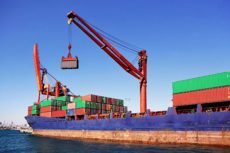 In most cases people recognize that increasing productivity is a good thing. If we develop new technologies or make organizational changes that allow us to produce more output with the same inputs, we celebrate. If people acquire education or experience that allows them to produce more with their human capital, we regard this payoff as wholly beneficial. And so forth.
In most cases people recognize that increasing productivity is a good thing. If we develop new technologies or make organizational changes that allow us to produce more output with the same inputs, we celebrate. If people acquire education or experience that allows them to produce more with their human capital, we regard this payoff as wholly beneficial. And so forth.
Yet in regard to one extremely important means of increasing our productivity, many people actually object strenuously. This bizarre case pertains to open international trade. Such trade is the simple and obvious means by which, for thousands of years, people have produced A, B, and C and exported it to buyers in other lands, using the proceeds to purchase X, Y, and Z from foreigners. Producing A, B, and C and exporting them is an indirect way of acquiring what we value more, namely, X, Y, and Z. For example, Americans produce software and soy beans and use them to acquire computers and automobiles from the Japanese and South Koreans. The process of exchange need not be bilateral, of course. Americans export a great variety of goods and services to many foreign nations and, in exchange, import a great variety of goods and services from many foreign nations. Yet producing and exporting goods is clearly always a means whereby the goods produced abroad and imported into the USA are acquired at lesser total resource cost than would be the case if those goods were produced domestically.

 In the Cold War era, Eastern bloc countries prevented their citizens from leaving. The Berlin Wall was the most iconic symbol of the Eastern bloc’s no exit policy. Hillary Clinton’s proposed exit tax “on the untaxed overseas earnings of multinational companies that leave the U.S.” falls short of being a Berlin Wall for U.S. corporations only because it is not as extreme. Its philosophical foundation is the same: prevent those who want to leave the country for better conditions elsewhere from doing so.
In the Cold War era, Eastern bloc countries prevented their citizens from leaving. The Berlin Wall was the most iconic symbol of the Eastern bloc’s no exit policy. Hillary Clinton’s proposed exit tax “on the untaxed overseas earnings of multinational companies that leave the U.S.” falls short of being a Berlin Wall for U.S. corporations only because it is not as extreme. Its philosophical foundation is the same: prevent those who want to leave the country for better conditions elsewhere from doing so. As the saying goes, “life imitates art.” Sometimes my research interests pop up in places I don’t expect. Recently it happened close to home.
As the saying goes, “life imitates art.” Sometimes my research interests pop up in places I don’t expect. Recently it happened close to home. Election campaigns
Election campaigns
 The U.S. Census Bureau has just released the Current Population Report’s
The U.S. Census Bureau has just released the Current Population Report’s  A couple weeks ago, San Francisco 49ers quarterback Colin Kaepernick came under intense scrutiny for refusing to stand up during the national anthem. As he plans to continue this behavior during the regular season, it’s unlikely the firestorm will subside anytime soon.
A couple weeks ago, San Francisco 49ers quarterback Colin Kaepernick came under intense scrutiny for refusing to stand up during the national anthem. As he plans to continue this behavior during the regular season, it’s unlikely the firestorm will subside anytime soon.





